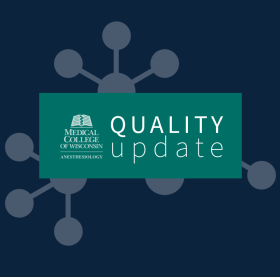
Quality Update Newsletter: Issue No. 2
Quality Newsletter- Issue No 2
Welcome! This Newsletter is chronicling the wonderful efforts done by the divisions in the Department of Anesthesiology as well as the CA2 residents and their faculty mentors in the past academic year.
Reading through the newsletters, references, and completion of the questions with > 70% correct responses will allow you to claim up to 1 hour of CME time, which will also count towards ABA MOCA Part IV requirements. If you are interested in contributing an article (which can also count towards MOCA Part IV credit) please contact Sheila Blogg at [email protected]
Keywords: Standard of Care, Clinical Competence, Total Quality Management, Quality Assurance, Health Care, Practice Guidelines as Topic
This module will take up to 60 minutes to complete and contains 3 required elements:
- Read the online newsletter and associated references
- Quality Update Quiz (with a 70% passing grade)
- Complete Evaluation Form
Target Audience
- Physicians
- Nurses
- Physician Assistants
- Nurse Practitioners
- Pharmacists
- Psychologists
Learning Objectives
- Identify individual departmental patient QI goals, with specific interventions and patient-oriented goals as metrics of success
- Change from generalized practice to the recommended standardized quality and value-based practices as highlighted in the educational content, including supplied specific literature
- Connect intraoperative interventions to post-operative patient safety outcomes
Inside This Issue:
- Effect of Spaced Learning on Acquisition of Factual Knowledge of Monitoring and Dosing of NMB and Reversal Agents and its Impact on Clinical Practice
- Collaborative Effort to Decrease Cardiac Surgery Blood Utilization
- The use of autologous normovolemic hemodilution followed the current guidelines set forth by the Society of Advancement of Blood Management (SABM). SABM guidelines contradict the use of ANH in patients with arrhythmias and active infection.
- DASI as a predictor of Postop Adverse events
- “LAST” CA2 Presentation
- SOS PROGRAM- growing the Second Victim Management
- CIED “Cardiac implantable electrical devices”
- Intraoperative Handoffs
Zachary Smith, MD
The Medical College of Wisconsin designates this activity for up to 1.0 hours of participation for continuing education for allied health professionals.
Available Credit
- 1.00 AMA PRA Category 1 Credit(s)™AMA PRA Category 1 Credit(s)™
- 1.00 Hours of ParticipationHours of Participation credit.

 Facebook
Facebook X
X LinkedIn
LinkedIn Forward
Forward